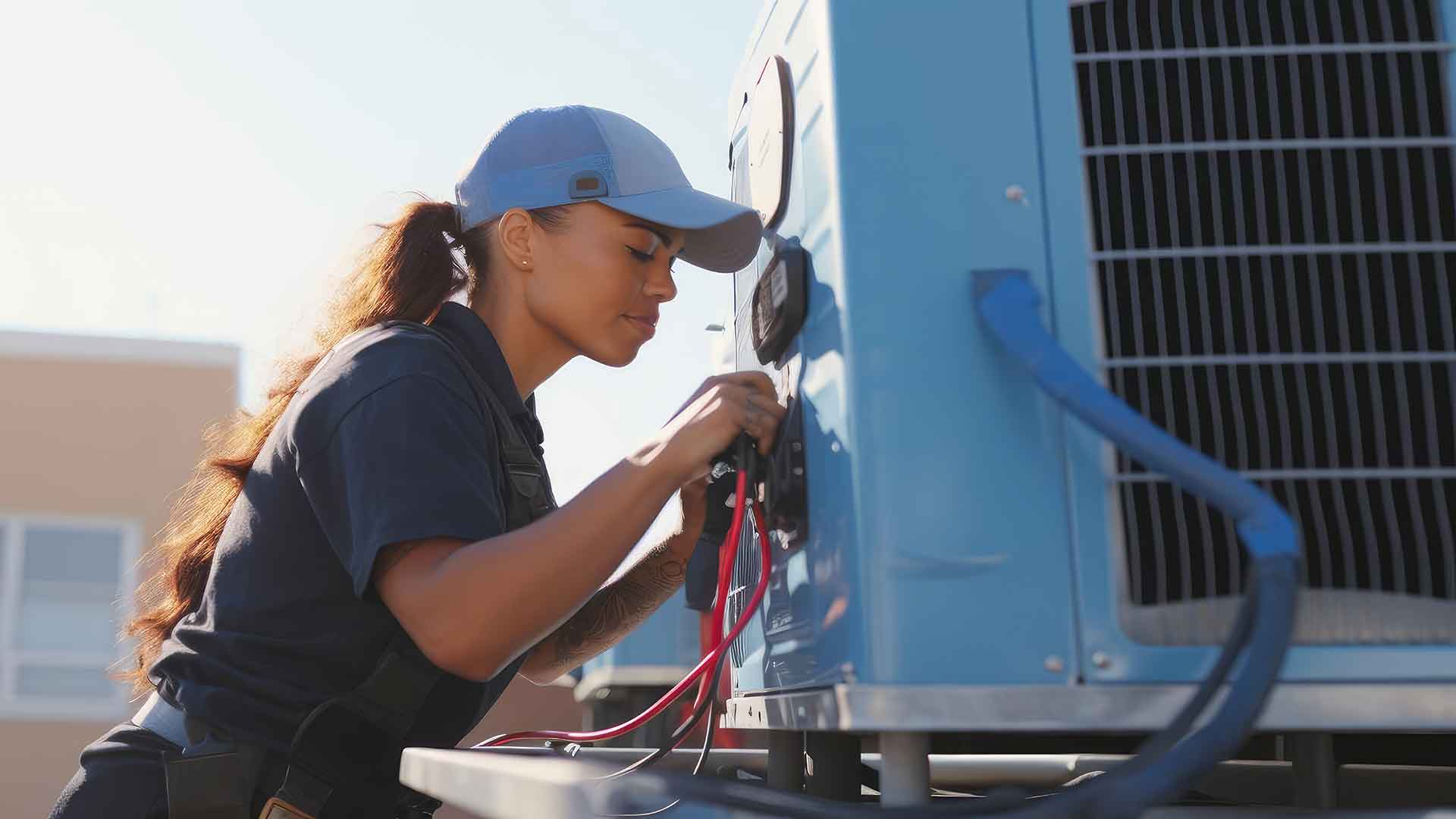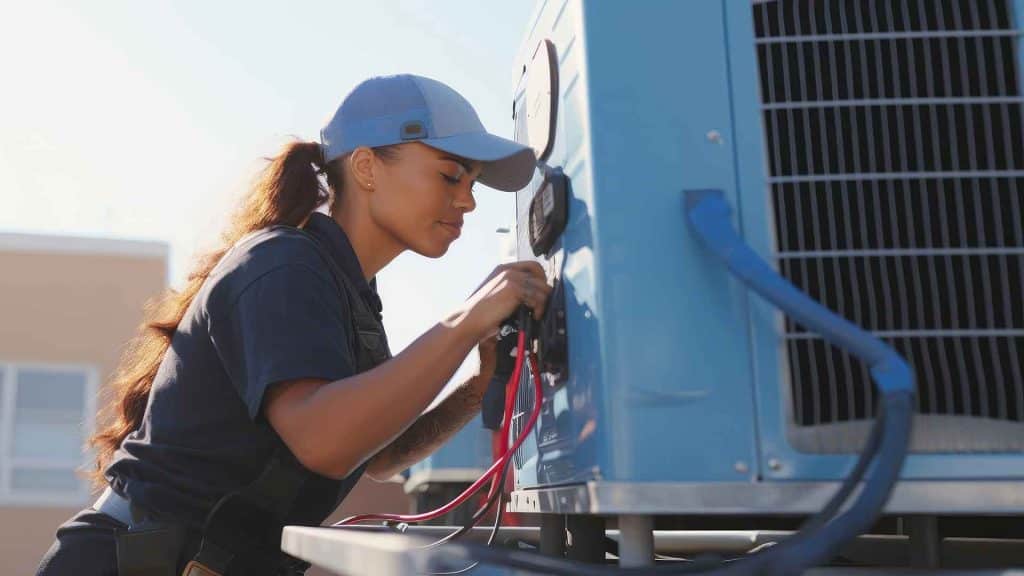
Online HVAC certification & programs guide
Table of Contents
What is an HVAC certificate? | Admissions requirements | What to look for | Curriculum | Apprenticeships | Licensure | Advancing | FAQs | Get started
What is HVAC or HVAC/R?
HVAC, or in many cases HVAC/R, is the acronym for heating, ventilation, air conditioning/refrigeration. In this trade you’ll be a wizard at installing, troubleshooting, repairing and maintaining all these types of units, so there will be an educational path you’ll need to complete to handle the complexity of your duties successfully.
As an HVAC or HVAC/R technician, you’ll provide a service that is needed in construction, commercial, public and industrial industries. On the job you’ll offer your invaluable skillset to home-owners, apartment and condominium complexes, hospitals, schools and for a multitude of construction projects as diverse in size as large corporate headquarters or small business industrial parks. There is no industry or type of building in which you won’t play a part, and you’ll be handling a variety of diverse tasks, from repairing commercial refrigeration units to troubleshooting complex heating systems.
Are you ready to find your new college program?
What is an HVAC certificate?
Online HVAC certificate and diploma programs prepare you for the job by providing the essential information you’ll need without the frills you don’t. This is one reason why certificate programs are shorter than degree programs. That’s not to say you can’t earn an associate or bachelor’s degree in HVAC technology, especially if you want to have your own business or become a manager, but if your goal is to get to work sooner as an HVAC technician, a certificate or diploma should suffice.
Your online HVAC certificate program should be accredited to ensure quality and contain state-of-the-art course content that has been vetted and approved by professionals. Ideally, it should prepare you to be job-ready after graduation by offering online simulations, animations and how-to videos. At the time of completion, you should be prepared to pass the EPA certification exam which is required for employers to hire you.
Online HVAC certificate programs generally take between six and 12 months to complete. Look for programs that are self-paced and offer hands-on learning options and ready access to appliance manual and error code guides and other tools of the trade. Some programs may even provide study guides, cover some or all of your exam costs and other perks to help you pass the EPA exam and launch your career at the apprenticeship level.
Admissions requirements
The only requirement for applying to—and being accepted in—an online HVAC certificate course is a high school diploma or your GED and acceptable GPA scores of around 3.0 if you plan to apply for financial assistance. Those who are either still in high school or want to get a jump on their program curriculum can take high school classes in machinery or wood shop, math, algebra and physics.
Things to look for in an online HVAC certification program
Besides accreditation, which ensures quality but may not be mandatory if you’re in an apprenticeship or in a bootcamp, ask about job placement rates for previous students, and see if your school offers job placement services such as available apprenticeships or internships, and exam prep help for the EPA Section 608 exam.
If you need financial assistance (HVAC programs can cost between $1,200 and $15,000, depending upon your school), you can ask your school if they offer any aid, or you can research resources such as Home Depot Scholarships, the National Association of Women in Construction (NAWIC) Scholarship, regional and local business and memorial scholarships, or federal resources if your program is accredited, such as Federal Student Aid.

What you’ll learn in your online HVAC courses
You’ll likely start your program with an overview of the course. Most trade and vocational schools and online colleges are invested in your success so they will want to make sure you understand how to use the tools and resources available to you, and that you are able to transition into your online program easily. Once you are set up with the right technology and can access course curriculum, your classes may cover the following subjects:
- Introduction to HVAC/R
- Basic mathematics and algebra
- Basic physics and chemistry
- Fundamentals of HVAC
- Refrigeration systems
- Heating systems
- Electrical systems
- Residential and commercial systems management
- System design and installation
- Refrigeration for commercial business
- Troubleshooting, installation and maintenance for systems
- Safety, tools and equipment
- Food preservation, thermal storage and water systems
- Soldering and brazing
- Writing and reading drawings, schemas and blueprints
Browse our vetted selection of online HVAC programs
All Online Schools is an advertising-supported site. Featured or trusted partner programs and all school search finder, or match results are for schools that compensate us. This compensation does not influence our resource guides, or other editorially-independent information published on this site.
HVAC/R Apprenticeships
An HVAC/R apprenticeship may provide a hybrid experience of on-the-job training and classroom or online instruction—even allowing you to earn a salary while learning your trade. Apprenticeships can be either union or merit-based education paths that can help employers recruit new technicians as highly skilled employees.
Most HVAC/R apprenticeships are four or five years long with employees receiving an increasing wage at regular intervals. The work usually begins with simple HVAC/R tasks and progresses to more complex tasks as time goes on. Upon successful completion of the apprenticeship a student can graduate to be a journeyman HVAC technician.
Individuals can forego HVAC/R education and enter directly into an apprenticeship, but many choose to first complete certificate programs online or in a classroom and then enter the apprenticeship. In some cases, the length of the apprenticeship may be shortened by completing HVAC/R certificate or diploma program first.
Pros of an apprenticeship
- Earning wages while you learn
- There may be a guaranteed job at the end of the apprenticeship
Cons of an apprenticeship
- Length of the apprenticeship with lesser wages
- Shorter certificate programs may allow you to enter the workforce faster, at a higher salary with benefits than apprenticeships
Licensure requirements
Most states require HVAC/R techs to be licensed, and requirements for licensure vary by state. An example of licensure requirements are as follows for Washington state, which offers two license types:
HVAC license trainee level
HVAC professionals who want to work at the trainee level must work under the supervision of either a journey or master electrician. The trainee license is valid for two years and HVAC professionals are required to obtain at least 24 hours of learning per year to renew their license. Those looking to apply must be at least 16 years of age and must attend some form of an apprenticeship program.
HVAC license journey and master level
HVAC professionals that want to work at the journey level must obtain one of two different Specialty Electrician HVAC/R licenses to perform the job in Washington. The 06A license requires HVAC professionals must have worked a minimum of 4,000 hours at the trainee level in addition to completing at least 48 hours of education. The 06B license requires HVAC professionals to have worked a minimum of 2,000 hours in addition to completing at least 24 hours of education.
HVAC professionals who have completed their journey level have the option to become master electricians. Working as a master electrician requires being licensed at either the journey or specialty level in addition to passing a required exam.
Different cities and metropolitan areas may also require a license to work in that geographic location. Many of these types of licenses are issued by the city’s department of construction and inspection or business license offices.
Levels of HVAC technicians: Career progression
Though you’ll enter the field as an apprentice technician, the next rung on the career progression ladder is the journey level. To become a journey HVAC tech, you’ll need to complete your education and apprenticeship and gain experience on the job. Once you’ve earned the necessary experience as a journeyman HVAC technician, you’ll be able to take the master specialist certificate exam.
To qualify for the designation of master specialist, you must have a minimum of three years of field experience and earn a passing score in the written professional level HVAC Excellence technician certification exam (or the equivalent NATE, RSES CM, SM, CMS, UA Star), and pass the hands-on performance test. The goal of the hands-on demonstration is to show that you can apply what you’ve learned.
Though the written exam shows whether you have the knowledge to comprehend codes and diagnostics, it’s vitally important that you can apply this regulations knowledge in a real-world, hands-on environment. The master specialist program requires you to demonstrate learned knowledge and then practically and effectively apply that knowledge in live situations.
What about other online specialized HVAC certifications?
If you choose to pursue a particular area of HVAC/R, there are specialized professional certifications and certificates available online. Besides EPA certification, which is mandatory and issued after completing your online program and passing the exam, you can consider earning the following types of credentials, which are just a few of the many credentials available:
- R-410A: Although it’s not required to work with refrigerants, R-410A certification is beneficial because of the complexity that’s associated with R-410A equipment. The R-410A is designed to teach technicians to handle this refrigerant safely.
- Indoor Air Quality (IAQ) certification: Indoor air quality is a top priority for technicians. With IAQ certification, technicians can add indoor air quality services to their resume. This training and exam cover the best ways for a technician to inspect, adjust and maintain a building’s ducting to create cleaner air within the structure.
- NATE certificates: NATE offers the RTW (Ready to Work) and the HVAC Support Technician certificates. The RTW exam is available online only and can be taken from any computer. Note that this is a certificate, not a certification, and it is valid for five years, and then must be renewed by retaking the exam. This exam is designed to support technicians who have worked in the field for six to 12 months. Earning this certificate demonstrates increased knowledge and skills. The HVAC Support Technician certificate is a monitored test, so technicians must take this exam at a recognized testing center. This credential is valid for five years and can be renewed by retaking the exam.
- Preventive Maintenance (PM) HVAC Certification: Following EPA Section 608 certification, earning Preventive Maintenance (PM) certification allows you to build on your knowledge and provide your customers with the best services possible. PM technicians learn the latest techniques in preventative maintenance for HVAC/R equipment and can diagnose problems, apply repairs to fix those problems and perform services to keep further problems from occurring.
Frequently Asked Questions (FAQ)
Is there an advantage to joining an HVAC union?
There are different unions for HVAC techs, including the Steamfitters, Servicefitters and the International Union of Operating Engineers. Servicefitters is open to anyone in the HVAC industry, and once you are hired by an HVAC union contractor as a helper, apprentice or junior tech, your employer will refer you for membership in the union within 45 days. Benefits to joining a union include regular pay raises and overtime pay, a pension, continued training and the support of the union during disputes. Joining a union is not mandatory and is an entirely personal choice.
Do union HVAC techs earn more?
For entry level jobs, you might find that non-union employers pay a little bit more to start but with guaranteed union pay raises, union HVAC/R technicians may catch up and surpass what non-union techs earn. Plus, if you consider benefits besides wages, union employees ultimately make more due to having benefits such as healthcare insurance and pension plans.
How much math will I need to know to be an HVAC?
HVAC technicians need to be able to do some basic math to determine, say, the amount of refrigerant to use in a system, translate a blueprint design or calculate the amount of electricity that a system needs. You don’t have to be a math whiz, but you should have math skills comparable to the basic algebra level.
What could my salary be?
The U.S. Bureau of Labor Statistics says HVAC technicians earned a median annual salary of $57,300. Those in the lowest 10%, such as entry-level or apprentice-level techs, earned $37,270 while journey to master-level technicians or those who had years of experience were in the top 90% of the field, and earned median annual salaries of $84,250.
Is an online HVAC school as good as a classroom-based program?
There will be little difference in your program quality. Online HVAC certificate programs are great alternatives for students who want to complete their program faster than a classroom course, and they tend to be lower in cost too. Choosing an accredited course, no matter whether online or classroom should maximize quality, but remember that even in an online course you will likely need to do some in-person, hands-on application of what you learned online.
Getting started
With job growth above the national average and a moderately quick entry into the field, there’s no better time to act and enroll in an HVAC/R certificate or diploma program online. Your course will provide the same quality education as an on-campus program, and you’ll have the luxury of working, tending to family obligations and perhaps even adding hours toward your apprenticeship while you hone your skills and prepare to take the EPA exam. HVAC/R technicians will always be needed, no matter what the economy or job market, so why not take the first steps toward securing your future? All you need to do is click the Find Schools button to discover your options.

Are you ready for a new adventure?
Find your new school today!
All Online Schools is an advertising-supported site. Featured or trusted partner programs and all school search finder, or match results are for schools that compensate us. This compensation does not influence our resource guides, or other editorially-independent information published on this site.


All Online Schools is an advertising-supported site. Featured or trusted partner programs and all school search finder, or match results are for schools that compensate us. This compensation does not influence our resource guides, or other editorially-independent information published on this site.